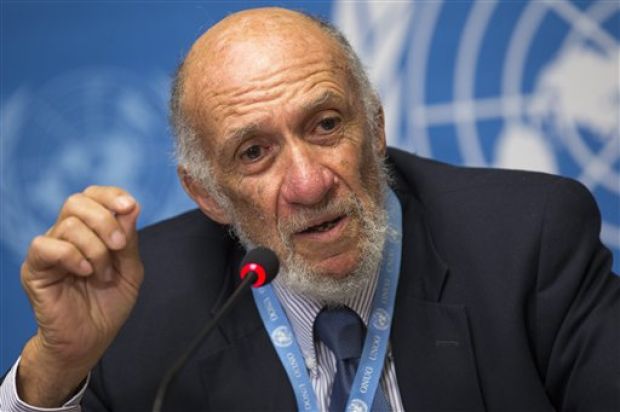UPDATES
UNHRC’s Richard Falk in hot water again – this time for using his official position to attack an NGO critical of him
June 14, 2013 | Jeni Willenzik

In the latest controversy at the United Nations Human Rights Council (HRC), UN Special Rapporteur Richard Falk used an official UN report meant to highlight injustices in the Palestinian territories to condemn an NGO critical of him. In the report, Falk blamed UN Watch, a non-governmental organisation founded to monitor the performance of the UN against its charter, for discrediting his arguments and issuing criticism to UN diplomats and officials. He also called for UN Watch to be investigated to see whether it is actually “indirectly sponsored by the Government of Israel and/or other ‘pro-Israel lobbying groups,'” – implying that if it was, it should lose its UN accreditation.
The report expressed his disappointment that senior UN officials had taken allegations against him seriously. Additionally, he called for a mechanism to be established at the UN to protect special rapporteurs who are subject to “defamatory” attacks. Recently, UN Secretary-General Ban Ki-moon rejected Falk’s suggestion that the US is “fortunate” not to have experienced worse than the Boston Marathon bombings, which he claims were an inevitable reaction to foreign policy he coined as the “American global domination project.” Other allegations have been made against Falk’s comparison of Israel to Nazi Germany, his decision to post an antisemitic cartoon on his blog, and his calls for the investigation of theories that the September 11, 2001 attacks on the World Trade Centre and Pentagon were an “inside job.” (AIJAC has written regularly about Falk’s penchant for extremism and conspiracy theories – for instance, here, here and here.)
Originally mandated by the HRC to report exclusively on Israeli violations of human rights and international law in the territories, Falk has been critiqued regularly for the one-sided bias of his reports. In 2008, Falk responded to these criticisms by requesting to expand his mandate to also include Palestinian violations. However, his most recent annual report of violations in these territories again focused solely on allegations against Israel – and on UN Watch.
The European Union, the United States, Canada, and Israel have each criticised Falk’s report for its imbalance and inaccuracy. Several countries and organisations have called for his resignation or removal.
US Ambassador to the UN Human Rights Council Eileen Donahoe condemned Falk’s charges against UN Watch by reiterating how important NGO work is to the preservation of human rights. She said that his accusations “threaten the independent voice of civil society at the UN.”
“Mr. Falk’s most recent statement, which he dramatically and recklessly included in an official UN document, is characteristic of previous reprehensible comments and actions he has made during his tenure,” said Donahoe.
The European Union also denounced the lack of progress that has been made towards a more factually accurate and legal analysis of the conflict. The EU has requested a more balanced mandate of the Special Rapporteur, which has failed to criticise acts of terrorism and human rights violations by Hamas, Hezbollah, and others.
The Falk controversy is part of a broader issue regarding prejudice against Israel at the UN Human Rights Council. The 47 members of the HRC are elected by the General Assembly, with a majority from Asia and Africa. No measures are currently in place to stop human rights violators from being elected to the council. Because Israel is blocked admission to relevant Regional Groups in Geneva, it cannot become a member of the HRC.
In a report about the treatment of Israel at the UN, the Anti-Defamation League issued the following statement:
“The UN Human Rights Council (HRC), which replaced the Commission on Human Rights in March 2006, has continued its predecessor’s extreme focus on and biased treatment of issues relating to Israel, particularly in comparison with its mild action on pressing international human rights crises. The permanent agenda of the HRC includes a specific item targeting Israel – Agenda Item #7 – which is titled: “Human rights situation in Palestine and other occupied Arab territories: Human rights violations and implications of the Israeli occupation of Palestine and other occupied Arab territories and the Right to self-determination of the Palestinian people.” Israel is the only country to appear on the HRC’s permanent agenda, while other countries such as China and Sudan, notorious for their human rights abuses, are included as part of the general debate.”
Falk’s latest faux pas highlights yet again how badly this important body has gone astray – and how badly the concept of universal human rights is being damaged by the politicisation and biases which have been allowed to flourish at the UN’s primary body for promoting and monitoring them.
Jeni Willenzik
Tags: Israel





